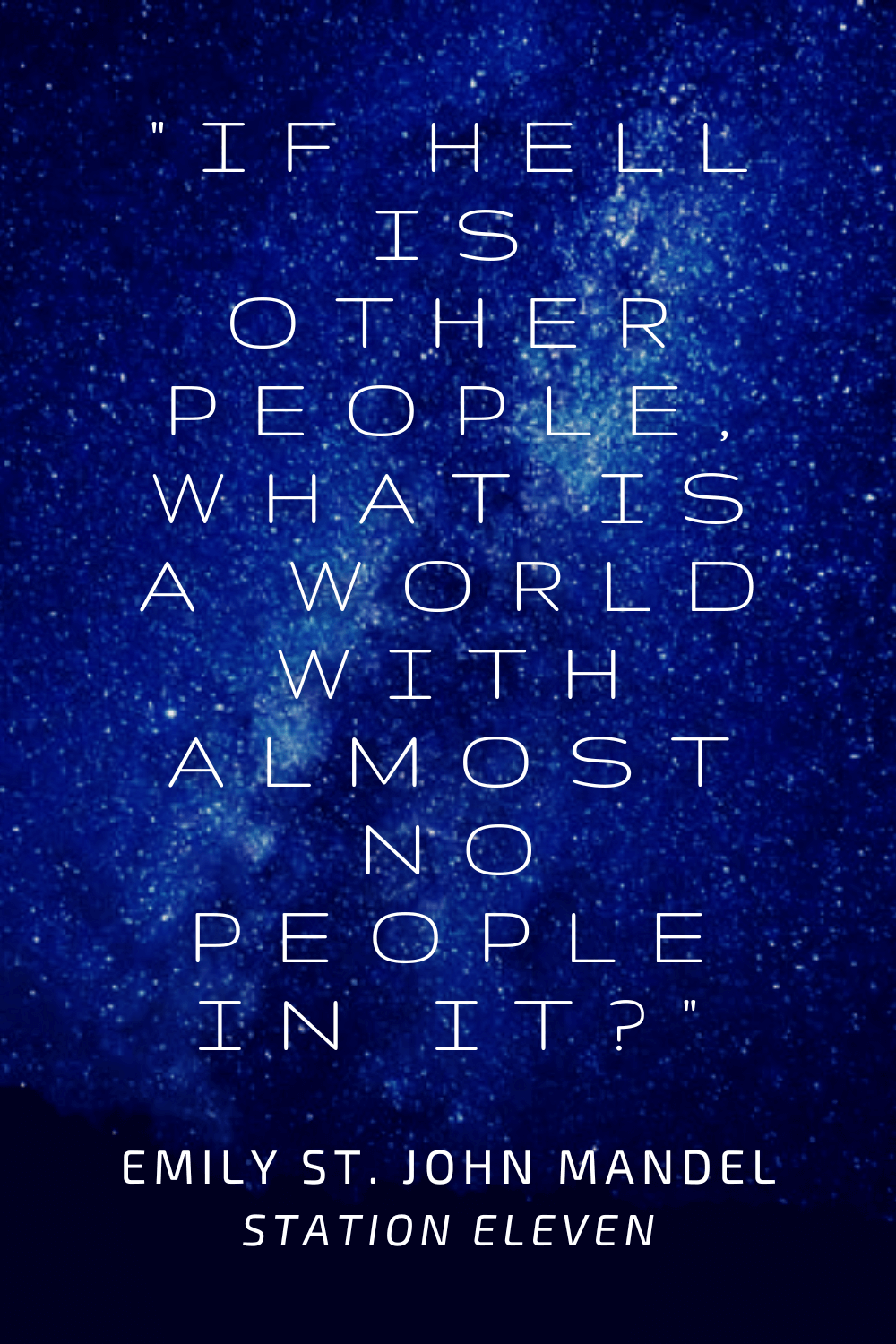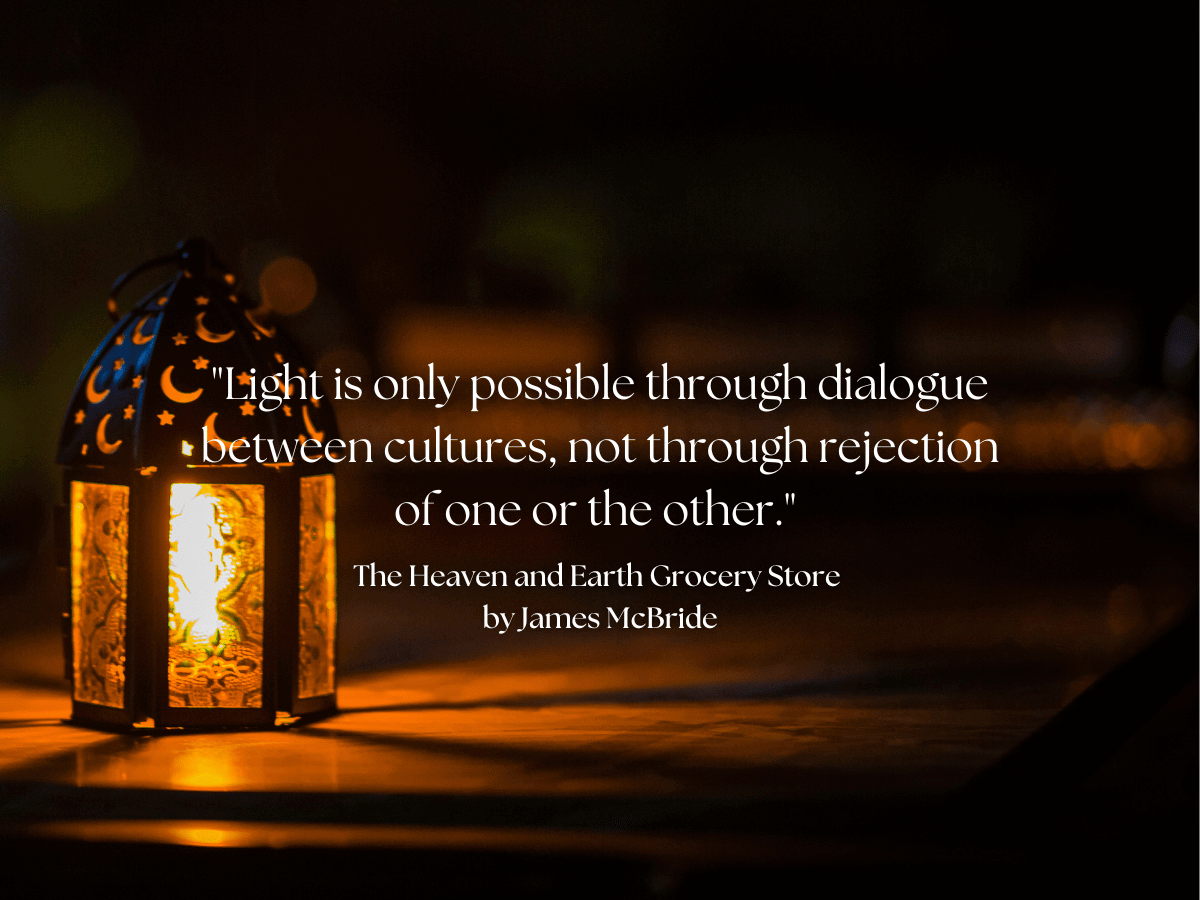I’ve gathered 24 of the most powerful Station Eleven quotes—with page numbers—so you can revisit the heart of the novel again and again.
Originally published in 2014, Station Eleven by Emily St. John Mandel was prophetic. While it wasn’t called the “Georgia Flu,” and thankfully, it didn’t wipe out most of the population, a mere six years after this book was published, the world suffered through the COVID-19 pandemic.
Reading Station Eleven brought back memories of the pandemic that I had forgotten (or repressed). I remembered the tedious process of wiping down groceries with Clorox wipes, sheltering in place, and looking to the television and news for any updates. Wondering, just how devastating will this pandemic be? How long will it last? How many will die?
I was still teaching English at the time, and we had heard rumors of a virus beginning to spread. I told each of my classes that I would keep in touch with them over Spring Break to update them on the situation and what it meant for our in-person classes.
I never saw any of my students again. In-person classes were canceled after Spring Break and shifted online.
In a daze, I remember finishing out that semester the best we could. It was a difficult time to focus.
There’s a scene early on in Station Eleven where one of the main characters goes to a nearby grocery store and stocks up on piles of food and supplies, and the cashier thinks he’s gone crazy. It reminded me of a similar moment from my experience.
The day that I said my last in-person goodbye to my students, I drove to a Publix grocery store located 5 minutes away from the college. I stocked up on canned goods, frozen foods, toiletries, medical supplies–anything I thought we might need. By the time I had made it through the last aisle, my cart was piled so high you could barely see me pushing it into the line.
I remember the cashier giving me a slightly odd stare, but that was it. I had enough food for 6 months, give or take, and I thought, “It’s not like any of this is going to go to waste. I’d rather be overprepared any day.” Turns out, it was a good choice.
The world changed, and we all changed along with it, for better or worse.
The pandemic changed how I look at the world. I don’t take anything for granted anymore. Another pandemic could sweep through and be an even more deadly strain, faster acting.
What do I value? What do I bring with me, preserve, or cultivate? How do I adapt to a changing society or, worst case scenario, the complete destruction of the world and life I once knew?
These are just a few of the questions that Emily St. John Mandel asks of her characters as they navigate their changing world. Through the dystopian darkness that she creates in Station Eleven, she weaves in moments of grace, beauty, and hope to shine a small glimmer of light on the good that can still happen even when the world is at its darkest.
I hope you enjoy these top Station Eleven quotes with page numbers…
24 Best Station Eleven Quotes with Page Numbers
1. The Theatre
1. “He thought of finding a bar somewhere, but he didn’t want to talk to anyone, and when he thought about it, he didn’t especially want to be drunk. Just to be alone for a moment, while he decided where to go next. He stepped into the silence of the park.” Station Eleven, Chapter 1, pg. 12, by Emily St. John Mandel
2. “Of all of them there at the bar that night, the bartender was the one who survived the longest. He died three weeks later on the road out of the city.” Station Eleven, Chapter 2, pg. 15, by Emily St. John Mandel
3. “Jeevan was crushed by a sudden certainty that this was it, that this illness Hua was describing was going to be the divide between a before and an after, a line drawn through his life.” Station Eleven, Chapter 3, pg. 20, by Emily St. John Mandel
4. “This was during the final month of the era when it was possible to press a series of buttons on a telephone and speak with someone on the far side of the earth.” Station Eleven, Chapter 5, pg. 30, by Emily St. John Mandel
2. A Midsummer Night’s Dream
5. “All three caravans of the Traveling Symphony are labeled as such, THE TRAVELING SYMPHONY lettered in white on both sides, but the lead caravan carries an additional line of text: Because survival is insufficient.” Station Eleven, Chapter 11, pg. 58, by Emily St. John Mandel
3. I Prefer You With A Crown
6. “It’s possible that no one who didn’t grow up in a small place can understand how beautiful this is, how the anonymity of city life feels like freedom.” Station Eleven, Chapter 13, pg. 78, by Emily St. John Mandel
7. “They are always waiting, the people of the Undersea. They spend all their lives waiting for their lives to begin.” Station Eleven, Chapter 14, pg. 86, by Emily St. John Mandel
8. “You don’t have to understand it,” she said. “It’s mine.” Station Eleven, Chapter 14, pg. 87, by Emily St. John Mandel
9. “She knows there are traps everywhere that can make her cry, she knows the way she dies a little every time someone asks her for change and she doesn’t give it to them means that she’s too soft for this world or perhaps just for this city, she feels so small here.” Station Eleven, Chapter 14, pg. 89, by Emily St. John Mandel
10. “No one ever thinks they’re awful, even people who really actually are. It’s some sort of survival mechanism.” Station Eleven, Chapter 15, pg. 106, by Emily St. John Mandel
11. “…she’s come to understand that clothes are armor;” Station Eleven, Chapter 15, pg. 107, by Emily St. John Mandel
12. “in the morning puts on the clothes that make her invincible, a life where the moments of emptiness and disappointment are minimal, where by her midthirties she feels competent and at last more or less at ease in the world, studying foreign languages in first-class lounges and traveling in comfortable seats across oceans, meeting with clients and living her job, breathing her job, until she isn’t sure where she stops and her job begins, almost always loves her life but is often lonely, draws the stories of Station Eleven in hotel rooms at night.” Station Eleven, Chapter 15, pg. 107, by Emily St. John Mandel
4. The Starship
13. “Hell is the absence of the people you long for.” Station Eleven, Chapter 23, pg. 144, by Emily St. John Mandel

14. “If hell is other people, what is a world with almost no people in it?” Station Eleven, Chapter 24, pg. 148, by Emily St. John Mandel
15. “At unexpected moments find myself thinking, how did I get here? How have I landed in this life? Because it seems like an improbable outcome, when I look back at the sequence of events.” Station Eleven, Chapter 25, pg. 157, by Emily St. John Mandel
16. “I’m talking about these people who’ve ended up in one life instead of another and they are just so disappointed. Do you know what I mean? They’ve done what’s expected of them. They want to do something different but it’s impossible now, there’s a mortgage, kids, whatever, they’re trapped.” Station Eleven, Chapter 26, pg. 163, by Emily St. John Mandel
17. “moving half-asleep through the motions of his life for a while now, years; not specifically unhappy, but when had he last found real joy in his work? When was the last time he’d been truly moved by anything? When had he last felt awe or inspiration? He wished he could somehow go back and find the iPhone people whom he’d jostled on the sidewalk earlier, apologize to them—I’m sorry, I’ve just realized that I’m as minimally present in this world as you are” Station Eleven, Chapter 26, pg. 166, by Emily St. John Mandel
5. Toronto
18. “We bemoaned the impersonality of the modern world, but that was a lie, it seemed to him; it had never been impersonal at all. There had always been a massive delicate infrastructure of people, all of them working unnoticed around us, and when people stop going to work, the entire operation grinds to a halt. No one delivers fuel to the gas stations or the airports. Cars are stranded. Airplanes cannot fly. Trucks remain at their points of origin. Food never reaches the cities; grocery stores close. Businesses are locked and then looted. No one comes to work at the power plants or the substations, no one removes fallen trees from electrical lines. Jeevan was standing by the window when the lights went” Station Eleven, Chapter 30, pg. 178, by Emily St. John Mandel
19. “First we only want to be seen, but once we’re seen, that’s not enough anymore. After that, we want to be remembered.” Station Eleven, Chapter 34, pg. 187, by Emily St. John Mandel
6. The Airplanes
20. “Those previous versions of herself were so distant now that remembering them was almost like remembering other people, acquaintances, young women whom she’d known a long time ago, and she felt such compassion for them. ‘I regret nothing,” Station Eleven, Chapter 39, pg. 206, by Emily St. John Mandel
21. “She was thinking about the way she’d always taken for granted that the world had certain people in it, either central to her days or unseen and infrequently thought of. How without any one of these people the world is a subtly but unmistakably altered place, the dial turned just one or two degrees.” Station Eleven, Chapter 41, pg. 225, by Emily St. John Mandel
7. The Terminal
22. “Why, in his life of frequent travel, had he never recognized the beauty of flight? The improbability of it. The sound of the engines faded, the airplane receding into blue until it was folded into silence and became a far-distant dot in the sky.” Station Eleven, Chapter 43, pg. 247, by Emily St. John Mandel
8. Station Eleven
23. “She had the appreciation for nice things that comes only from having grown up with little money.” Station Eleven, Chapter 53, pg. 319, by Emily St. John Mandel
24. “He found he was a man who repented almost everything, regrets crowding in around him like moths to a light. This was actually the main difference between twenty-one and fifty-one, he decided, the sheer volume of regret.” Station Eleven, Chapter 53, pg. 327, by Emily St. John Mandel


